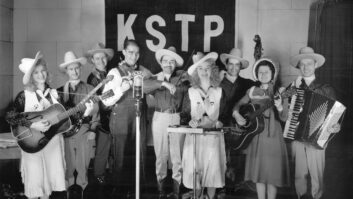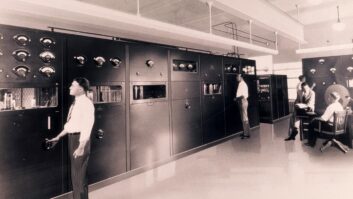Last night, as news that Michael Jackson had died of an apparent heart attack spread, radio stations reacted by playing his music and giving fans a place to express their emotions.
In Grand Rapids, Mich., “Local radio stations were flooded with calls Thursday evening as shocked listeners wanted to hear the music of Michael Jackson,” according to a report on WZZM Channel 13.
In the Research Park Triangle region of North Carolina, requests poured in to stations, according to MyNC.com.
Near Washington, D.C., hundreds fans gathered outside the headquarters of Radio One in suburban Lanham, Md. to remember and mourn the King of Pop. The Examiner has clips of the crowds.
In the suburban Washington offices of Radio World this morning, there were several rounds of the “where were you when you heard” conversation. While some of us caught the initial report on TMZ.com or saw mention of the report on Facebook or Twitter, others heard it via radio during their commute home.
I was on the way back from the neighborhood swimming pool where my 4½-year-old daughter had just had her first swimming lesson. The DC101 evening drive DJ, Roche, came out of playing former Soundgarden/Audioslave front man Chris Cornell’s 2006 cover of “Billie Jean” stressing that TMZ was the only source reporting Jackson’s death.
A few minutes later, after Alien Ant Farm’s cover of “Smooth Criminal” and Fall Out Boy and John Mayer’s collaboration on a cover of “Beat It,” Roche was back on air with the L.A. Times and other sources confirming the TMZ report. He then opened up the phone lines to listeners, asking whether or not the Clear Channel-owned rock station should play a block of Michael Jackson songs (as opposed to the rock covers he was spinning).
Brad Kava, writing for Examiner.com from San Francisco, noted that radio was a primary medium for many people on this story, not just because Jackson was a musician and radio star, but because, unlike the Internet, “Radio did not go down. The medium covered the event and is still covering it.” As the news spread, the sites associated with early reports crashed. The Twitter Fail Whale was a common sight for many twitts.
Those “where were you when you heard” conversations got me thinking about previous celebrity deaths. I don’t know if it’s a case of looking for coincidences or not, but the deaths of Princess Diana and Kurt Cobain are tied to the radio for me.
In 1997, I had been camping along the New Brunswick coast of the Bay of Fundy and woke up on September 1st to reports on CBC Radio 1 of Diana and Dodi al-Fayed’s car crash. The entire drive along Route 1 to the border crossing in St. Stephen, New Brunswick–Calais, Maine, was spent with CBC’s coverage of events in Paris and London, as well as commentary and remembrances from across Canada.
Three years earlier, on April 8th, 1994, I was in the long-term parking lot at National Airport, getting ready to fly back to New Orleans to visit my family, when the news broke that Kurt Cobain’s body had been found in his Seattle home. He had shot himself three days earlier.
I remember sitting there shocked for a little while, listening to the reports on WHFS (I believe Bob Waugh was the DJ on air at the time, or maybe it was Weasel) before getting out of the car to make my way to the check-in counter.
It was also in the car (in a mall parking lot north of Philadelphia, probably listening to WXPN) that I first heard Badly Drawn Boy’s “You Were Right” with its bridge: “I remember doing nothing / On the night, Sinatra died / And the night, Jeff Buckley died / And the night, Kurt Cobain died / And the night, John Lennon died / I remember I stayed up / To watch the news with everyone.”
The line about Cobain stood out to me at the time because of my clear memory of where I was when I heard; I don’t remember what I was doing or where I was when Sinatra and Buckley passed.
When Mark David Chapman shot Lennon in 1980, I was just 11, although as a sixth grader I was a huge radio fan, mostly the at-the-time-top-40 WQUE and WEZB. I remember the singles from Double Fantasy making to the playback of the day’s most requested songs each night, so there must have been some coverage of his death on air that I listened to. I have a stronger memory of Mrs. Vought being called out of the classroom and then returning to tell us that President Regan had been shot.
Three years earlier, when Elvis died, the only thing I remember is my friend across the street’s mother — she had a small Elvis shrine in her living room; she was from Tupelo, Miss., and had gone to Lawhon Elementary School with him — being sad.







